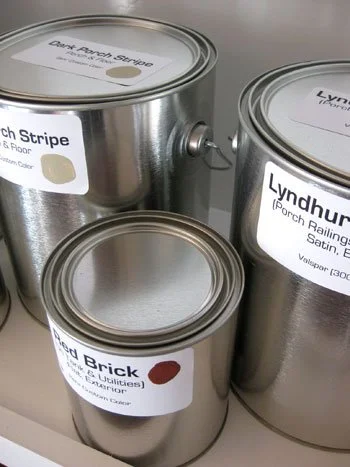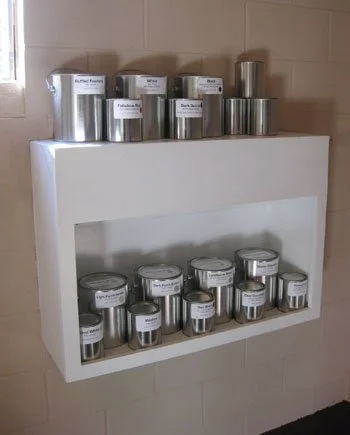Storing Left-Over Paint
Many people don’t give much thought to how they store their left-over paint but then they are disappointed when the paint they thought they could use has gone bad or even ruined the space underneath where the can was resting.
Properly stored paint will remain usable for at least 5 years. Here's how to make sure the leftover cans from your home projects stay fresh and ready for future touch-ups.
Mark It
Before putting paint away, mark it with a permanent marker. Include what room and surface the paint was used for, and the name, number, and sheen of the paint. It’s best to mark the side of the can which is less likely to rust or become damaged by other cans resting on top. Also, make sure to put a dab of the paint on the can (both the lid and the side) to show you what color is inside for easy identification.
Storage Containers
Many people just put the lid back on the gallon paint can when storing their used paint. This is not good practice as paint keeps better in full containers where it has less contact with air. Those gallon cans are not only bulky and take up a lot of space, but they also allow more paint surface to come in contact with air, so the paint dries up faster. The solution to that is either reuse an old quart-size can (make sure it has been completely cleaned out and thoroughly dried) or buy a new one in any paint or home improvement store. Glass jars are great to use too because they let you easily see what’s inside. These are the best options for storing paint in a smaller container:
A wide-mouth glass or plastic jar with a screw-top lid.
A clean, dry pint or quart-size paint can.
Store In Cool, Dry Area
Paints in tins should be stored in a dry place, off the ground or concrete floors to keep the metal from rusting or ruining the surface underneath. It is also best to store paint in a cool area but don’t allow it to freeze, or it will permanently separate and become unusable. Keep it away from direct sunlight or other heat sources (water boilers, radiators, heaters, etc) that will speed up paints deterioration. The best places to store paint are in a cool but dry utility closet, mudroom, or laundry room. Never store in an unheated garage, crawl space, shed, hot attic, or wet basement.
Ready To Reuse Your Paint
Do not shake an old can of paint before opening. You want to avoid mixing the contents with any dust, rust, or debris from the old can. Open the can first and always check for paint “skin” that may have formed on the top (especially if the paint has been stored for longer than a year, or wasn’t sealed properly). Carefully and thoroughly remove this film with a stick or spoon before stirring the paint, or you’ll end up with contaminated paint. If the “skin” breaks apart while you are removing it, you can strain the paint before using.
It’s important to stir paint really well every time before use to recombine all the ingredients that may have separated or settled on the bottom. And if the paint can’t be re-blended to look normal no matter how long you mix it, it means it’s turned bad. Give it a sniff. If it smells like anything other than what paint should smell like, it’s probably bad. However, try mixing it with a stir stick and see if the paint mixes together smoothly. After that, brush a little bit of the paint onto a test surface and see how well it spreads. If it’s rough and bumpy, it’s time to get rid of it.
Re-using left-over paint can be effective and cost-efficient. The easiest way to reuse or recycle good unwanted paint is to give it to an organization that can use it—for example, donate your unwanted paint to organizations like these:
Habitat For Humanity ReStore. HFH ReStores are outlets that accept donated building materials for resale and can often use good unused paint. For locations check here: ReStore locations.
High school or college theater arts department
A local charity, church, or community groups
Call Cobb Brothers for all your painting and carpentry needs. We are happy to utilize your properly stored paint if possible to save you money on your next painting project. 508-655-7910





